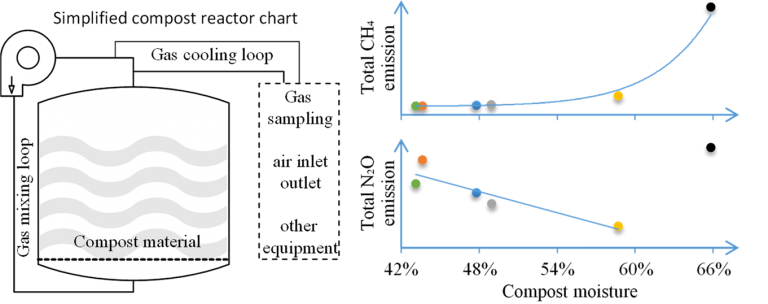
The effects of moisture on thermophilic composting process are investigated in the latest paper published in the Journal of Cleaner Production: https://doi.org/10.1016/j.jclepro.2019.118165
It is known that too wet active composts can cause excessive methane (CH4) emissions, but there is no consensus on how much and what exactly the rate of this change is with changing moisture.
We found that the increase in moisture in composting caused a significant exponential increase in CH4 emissions. Compost run at moisture close to 70% emitted nearly 1000 times more CH4 compared to compost run at around 40% moisture. For the nitrous oxide (N2O) we found the opposite, but a weaker effect: reduction in moisture caused a linear reduction in N2O emissions. When we looked at these emissions from their greenhouse effect perspective, even though N2O has a much higher global warming potential (ca. 300 times that of CO2), the strong increase in CH4 emission with high moisture content was still more relevant to address (see table below). The paper also discusses some mechanisms that cause the dynamics observed as well as strategies for possibly reducing these with appropriate moisture regulation.
| Compost reactor run | CH4 emissions | N2O emissions | Total |
|---|---|---|---|
| g CO2-eq. kg−1 feedstock (WW) | |||
| Run 1, Dry, MC 25–40% | 0.33 | 4.9 | 5.2 |
| Run 2, Dry, MC 25–40% | 0.48 | 3.9 | 4.4 |
| Run 3, MC 40–50% | 4.9 | 3.2 | 8.1 |
| Run 4, MC 40–50% | 2.0 | 2.6 | 4.6 |
| Run 5, Wet, MC 50–60% | 29 | 1.1 | 30 |
| Run 6, Wet, MC 60–70% | 227 | 4.4 | 231 |
Contact: Evgheni Ermolaev
